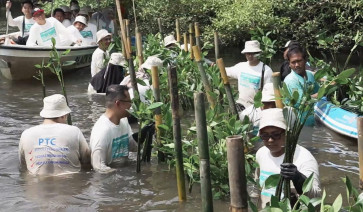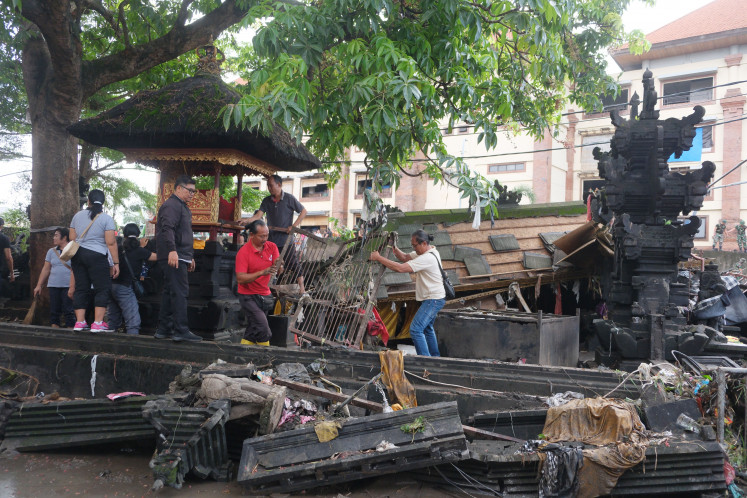Popular Reads
Top Results
Can't find what you're looking for?
View all search resultsPopular Reads
Top Results
Can't find what you're looking for?
View all search resultsInsight: Does Indonesia see foreign policy as irrelevant?
The diplomatic community and analysts around the world often think that Indonesia under President Joko âJokowiâ Widodo is no longer interested in regional and international engagement
Change text size
Gift Premium Articles
to Anyone
T
he diplomatic community and analysts around the world often think that Indonesia under President Joko 'Jokowi' Widodo is no longer interested in regional and international engagement. Worse, Indonesia is accused of becoming inward-looking, conducting self-centered diplomacy, being oblivious to international opinion and even abandoning ASEAN.
In short, they often ask an irritating question: Does Indonesia see foreign policy as irrelevant?
Of course, Indonesia is doing none of these things. In his speech at the Brookings Institution in Washington, DC, in October, President Jokowi rejected such a portrayal of Indonesia's foreign policy. He laid out Indonesia's foreign policy agenda, ranging from how Indonesia would deal with complex global issues such as climate change, peace-keeping and the Trans-Pacific Partnership (TPP), to the question of regional order and tension in East Asia. He even specifically stated, 'We are not becoming inward-looking.' Yet the perception persists.
The problem is that many tend to see summitry as an indicator of foreign policy interest, where leaders give long speeches full of beautiful phrases, exciting promises, carefully chosen quotes and jaw-dropping commitments. A fair assessment of a country's foreign policy should not merely be based on the beauty of its leaders' rhetoric. It should be seen as a collective effort by the entire foreign policy and diplomatic machinery. More importantly, it should be understood as a complex process of transforming words into deeds, where interests and obligations are fused together.
Indonesia's foreign policy under Jokowi should be understood as a balanced expression of national interest and international obligations. He was elected with a clear mandate to fix Indonesia's abundant domestic problems. Therefore, it is natural for him to devote more of his time and energy to managing domestic priorities. He also understands well that a country's international stature does not matter much unless it possesses a strong domestic base, especially the economy.
Greater domestic focus, however, does not mean that Indonesia no longer recognizes the importance of working together with partners and friends around the world. Indonesia's regional and global engagement remains strong. Despite many pressing issues at home, Jokowi has visited the United States, attended the G20 meeting in Turkey, participated in the ASEAN Summit and related meetings in Kuala Lumpur and flew to Paris for COP21. In between those travels, he held several bilateral meetings with visiting foreign leaders in Jakarta.
Over the last two weeks, Indonesia's regional engagement certainly suggests that the Jokowi government has not lost its strategic fervor. First, on Dec. 17, Indonesia engaged Japan in a historic 'two plus two' ministerial meeting attended by the foreign and defense ministers of both countries. The meeting, the first between Japan and an ASEAN member state, ended with significant outcomes set to deepen strategic cooperation between Indonesia and Japan in a wide range of areas such as maritime security cooperation, defense procurement, naval capacity-building and technology transfer.
Second, from Tokyo, Foreign Minister Retno LP Marsudi and Defense Minister Ryamizard Ryacudu flew to Australia to meet their Australian counterparts for another 'two plus two' meeting. The Sydney meeting discussed global challenges, regional security and a number of issues affecting bilateral relations, such as people smuggling.
The meeting clearly suggests that a degree of normalcy in Indonesia-Australia relations has returned. As close neighbors, there is no other option for Indonesia and Australia but to cooperate and forge a deep strategic partnership.
Third, prior to the 'two plus two' meetings with Japan and Australia, Indonesia took the lead in pushing for greater cooperation on maritime security among members of the East Asia Summit (EAS) in Kuala Lumpur last month. As the future of stability at sea is increasingly at risk amid growing naval competition and territorial disputes, Indonesia's initiative clearly reflects the country's awareness of not only its strategic position as a power between two oceans ' the Indian Ocean and the Pacific Ocean ' but also the responsibility that comes with that status.
After more than a year, a clearer vision of Jokowi's foreign policy has begun to unfold. As I mentioned earlier (The Jakarta Post, Dec. 12, 2015), Indonesia's foreign policy is guided by the principle of bebas-aktif (free and active), which is manifested in terms of diplomatic/economic 're-balancing' and 'hedging'. The core objective of that foreign policy remains: to serve Indonesia's national interest and fulfill its international obligations.
As Indonesia enters 2016, I believe we will see more initiatives. As a country with a deep sense of regional community and a responsible member of international society, it would be unthinkable for Indonesia to allow itself to become known as uninterested in foreign policy.
______________________________
The writer is a senior researcher at the Centre for Strategic and International Studies (CSIS), Jakarta










